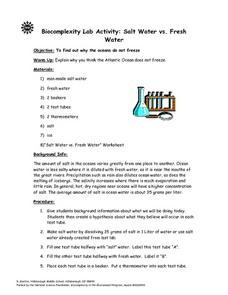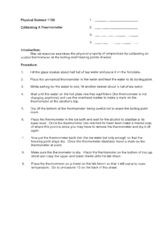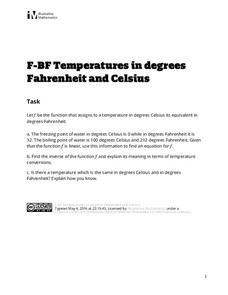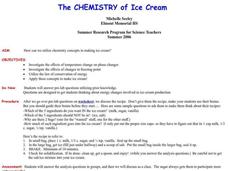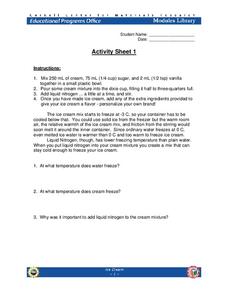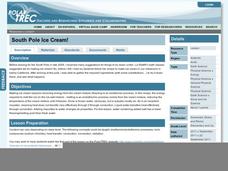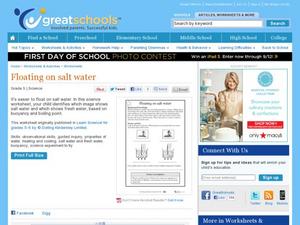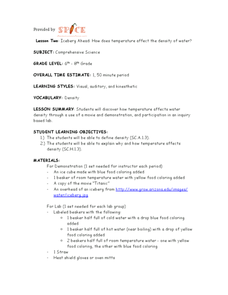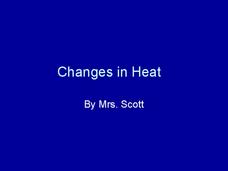Curated OER
Salt Water vs. Fresh Water
Students explore why the oceans do not freeze. They explain why they think the Atlantic Ocean does not freeze. Students are given background information about what they are doing. They create a hypothesis about what they believe...
Curated OER
WS 5.7 Phase Diagrams
In this phase diagram worksheet, students answer questions about three given diagrams. They determine the boiling point, melting points and sublimation points for each substance. They also answer questions about the triple points and the...
Curated OER
Kitchen Chemistry
Fifth graders examine both physical and chemical changes, and how to identify the difference between the two. They observe the changes that occur in butter when it is exposed to heat and cold, heat energy. In their notebooks, they write...
Curated OER
Water: Liquid or Solid?
First graders investigate how water can be both a liquid and a solid. They weigh popsicles and observe them as they write in their science journals. They measure the liquid as the popsicle melts and refreeze them to change them back...
Curated OER
Today's Temperature
Students study freezing temperatures and practice taking temperature readings with a thermometer. They write about a personal experience with weather. They discuss that the freezing point is at 32?? and that any water outside will...
Curated OER
Calibrating a Thermometer
Students calibrate an alcohol thermometer using the boiling and freezing point of water. In this physical science lesson, students explain what happens to boiling point of water as altitude increases. They calculate their experimental...
Curated OER
Solutions
In this chemical solutions instructional activity, students determine the molecular weight of a substance, determine the boiling and freezing point of solutions, and determine molarity of a solution. This instructional activity has 3...
Illustrative Mathematics
Temperatures in degrees Fahrenheit and Celsius
Learners investigate the relationship between the Fahrenheit and Celsius temperature scales. Given two data points, they construct a linear function to describe the relationship, find the inverse of the function, and make observations...
Illustrative Mathematics
Temperature in Degrees Fahrenheit and Celsius
Scholars develop the conversion formulas between Fahrenheit and Celsius with a task that presents the class with two known temperature equivalents between the two scales. Pupils use those two points to develop the linear conversion...
Curated OER
The Chemistry of Ice Cream
Students investigate the effects of temperature change on phase changes. They explore the effects of changes in freezing point and incorporate the law of conservation of energy. They utilize these concepts to make ice cream.
Curated OER
Weathering
In this weathering worksheet, students fill in 16 blanks with given terms about the types of weathering, the results of weathering and the causes of different types of weathering.
Mr. E. Science
Changes in Matter
Do solids, liquids, and gases even matter? The presentation focuses on changes in matter, including phases, Boyle's Law, Charles' Law, and physical changes.
Curated OER
Make Your Own Thermometer
Students recognize the concept of temperature, including degrees, and the melting and freezing process. In this 1st - 2nd grade lesson plan, students identify the temperature of various objects, as well as create their own paper...
Curated OER
Water Properties of the Great Salt Lake
Fourth graders examine the ecosystem of the Great Salt Lake in this two-part instructional activity, completing a KWL chart before and after the field trip to the site. While there, they draw and write about their observations. To test...
Cornell University
Isotopes
What better way is there to learn about isotopes than to play with them? Chemistry students manipulate the number of protons and neutrons in a hands-on activity. Individuals try to score the largest number of points by collecting the...
Polar Trec
South Pole Ice Cream!
How can you turn an ice cream activity into a scientific investigation? It's easy if you know ionic compounds, heat transfer, and the exothermic and endothermic process. Learners will explore the science behind freezing, insulation, and...
Virginia Department of Education
Molar Heat of Fusion for Water
How can you describe heat of fusion in a way the class understands and relates the importance of this concept to present day issues? In this third instructional activity of the series, learners conduct an experiment, demonstrating the...
Curated OER
Melting Ice
Students observe the melting of ice and explore the basic physical changes that occur. They gain information of how different substances change the rate of melting. Students discuss the properties of water and ice, the definition of...
Curated OER
Floating on Salt Water
Mixing substances together causes their properties to change. This resource illustrates that concept for fifth graders by having them consider four questions that have to do with buoyancy and boiling point. Learners begin to understand...
Curated OER
temperature and the Scientific Method Lesson Plan
Sixth graders study heat, temperature, and heat transfer. Using probeware, the teacher demonstrates boiling points. Students participate in experiments and record the beginning and ending temperatures and mass of objects. After...
Curated OER
Ice Cream in a Bag
Pupils discuss the three states of matter and how they are affected by temperature. They make ice cream in a bag while observing how temperature change affects the mixture. They discuss why some specimens froze more quickly than others...
CK-12 Foundation
Determining the Equation of a Line: Temperature Conversion Challenge
Line up the temperature conversions. Pupils create the linear function between Celsius and Fahrenheit on a graph by plotting the freezing and boiling points of water. The scholars determine how the relationship changes based upon...
Curated OER
Iceberg Ahead: How Does Temperature Affect the Density of Water?
Demonstrate how ice floats on water and get the class thinking about why icebergs are so deceiving. Investigators then experiment with mixing water of the same temperature and water of different temperatures. Make sure to explain the...
Curated OER
Changes in Heat
A thorough PowerPoint provides information related to changes in heat. The contrast between day and night temperatures is included. The concepts of boiling and freezing are also covered. Insulators and conductors are presented as well.
Other popular searches
- Freezing Point Depression
- Salt Water Freezing Point
- Freezing Point of Water
- Freezing Point Water
- Freezing Point Antifreeze
- Science Freezing Point
- What Is Freezing Point
- Temperature Freezing Point
- Freezing Point of Solutions
- Boiling and Freezing Points
- Boiling Freezing Points
- Solutes Lower Freezing Point


